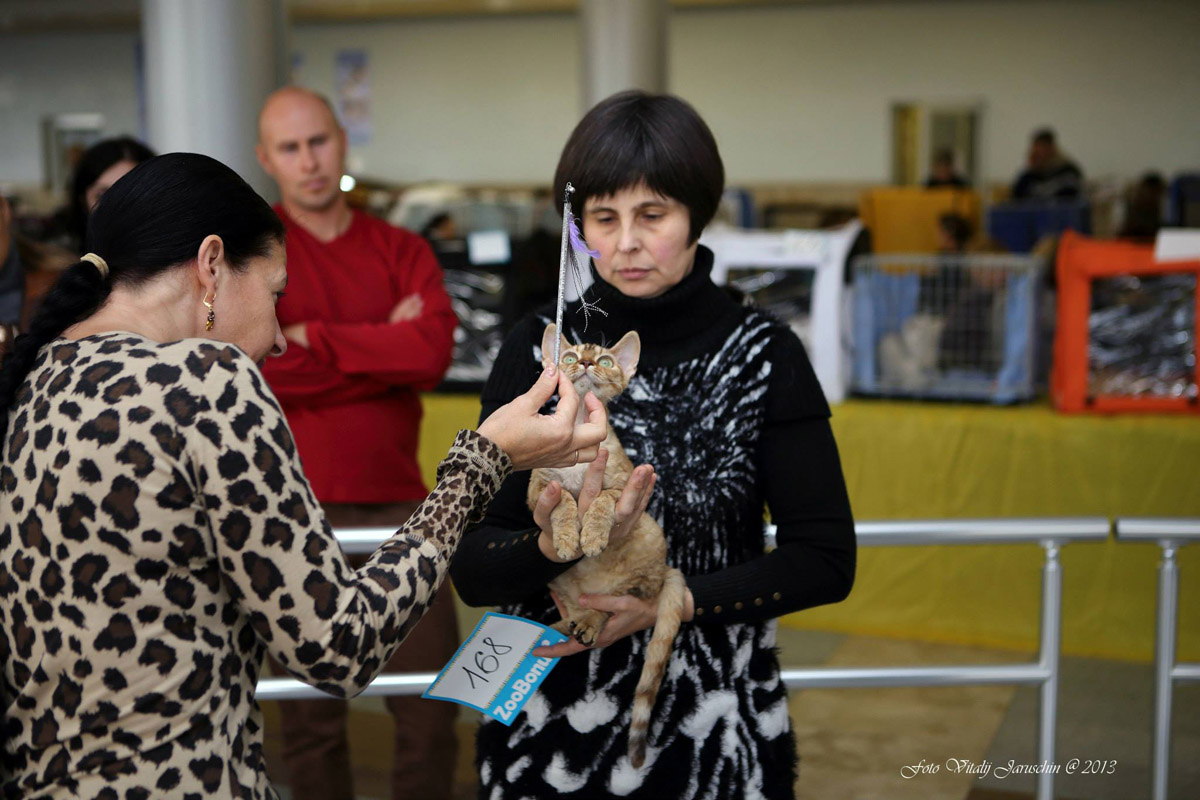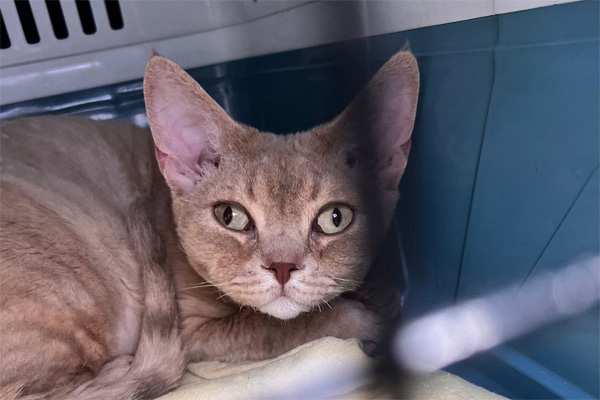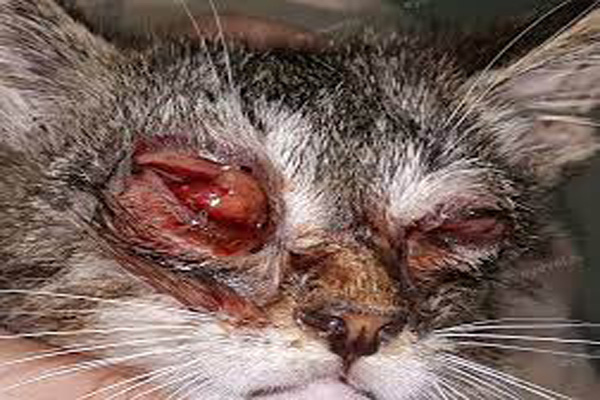
Welcome to our Devon Rex haven: the place where aliens and affection come together!
Discover the Extraordinary World of Devon Rex Cats
Are you ready to go on a cat adventure like no other? Enter the whimsical realm of the Devon Rex, a cat breed that will capture your heart and defy all expectations. Our Devon Rex cattery is committed to sharing the magic of these extraordinary creatures that bear an uncanny resemblance to aliens, yet share a deep and loving bond with their human companions.
In our cattery you can purchase both healthy and sick animals.Our animals may suffer from strabismus and herpesvirus.If you purchase a sick animal, you will not get a full refund..

Buy a cross-eyed Devon Rex kitten*
Understanding Strabismus in Devon Rex Cats: Causes and Symptoms
Devon Rex cats are known for their unique and captivating appearance, often resembling adorable aliens with their oversized ears and large eyes. While these felines are generally healthy and resilient, like any other breed, they may encounter health issues, and one such condition that can affect them is strabismus.
What is Strabismus?
Strabismus, commonly known as "cross-eyed" or "squint," is a condition where the eyes do not align properly. In Devon Rex cats, this misalignment can manifest in various ways, affecting one or both eyes. While strabismus is not exclusive to any particular breed, it's essential to be aware of the potential causes and symptoms in Devon Rex cats.
Causes of Strabismus in Devon Rex Cats:
-
Genetic Factors: Strabismus can be hereditary, and some cats may be predisposed to this condition due to their genetics. If a Devon Rex cat has a family history of strabismus, there may be an increased likelihood of the condition occurring.
-
Underlying Health Issues: Certain health conditions, such as neurological disorders or eye muscle problems, can contribute to strabismus in cats. It's crucial to monitor your Devon Rex's overall health and seek veterinary attention if any concerns arise.
-
Injury or Trauma: Physical injury or trauma to the head or eyes can lead to strabismus. Devon Rex cats, with their playful and active nature, may be prone to accidental injuries that could affect eye alignment.
Symptoms of Strabismus in Devon Rex Cats:
-
Visible Eye Misalignment: The most apparent sign of strabismus is the misalignment of one or both eyes. This can manifest as a noticeable inward or outward turn of the eyes.
-
Abnormal Eye Movements: Cats with strabismus may exhibit irregular eye movements, such as rapid eye twitching or difficulty tracking objects smoothly.
-
Head Tilt: Strabismus may be accompanied by a noticeable tilt of the head as the cat tries to compensate for the misalignment of the eyes.
-
Behavioral Changes: Some cats with strabismus may experience discomfort or changes in behavior. Watch for signs of squinting, pawing at the eyes, or increased sensitivity to light.
Seeking Veterinary Care:
If you observe any signs of strabismus in your Devon Rex cat, it's crucial to seek prompt veterinary care. A thorough examination by a veterinarian can help determine the underlying cause of the condition and guide appropriate treatment. In some cases, strabismus may not require intervention if it doesn't impact the cat's quality of life. However, addressing any underlying health issues is essential for overall feline well-being.
As responsible and caring cat owners, staying informed about potential health issues, such as strabismus, allows us to provide the best possible care for our beloved Devon Rex companions. Regular veterinary check-ups, a keen eye for changes in behavior, and a loving home environment contribute to the health and happiness of these extraordinary felines.

Buy a Devon Rex kitten with herpes virus****
Navigating Herpes Virus in Devon Rex Kittens: Understanding and Caring for Your Feline Companion
Devon Rex cats are beloved for their distinctive appearance and playful personalities, but like all breeds, they can face health challenges. One common issue is the feline herpesvirus, also known as feline viral rhinotracheitis (FVR). Herpesvirus is a contagious respiratory infection that can affect cats of all ages, including kittens. Understanding the problems associated with the herpesvirus and implementing appropriate care can help ensure the well-being of your Devon Rex kitten.
Common Problems Associated with Feline Herpes Virus:
-
Respiratory Symptoms: Feline herpesvirus primarily affects the respiratory system, leading to symptoms such as sneezing, nasal discharge, and congestion. In kittens, these symptoms can be more severe and may include difficulty breathing.
-
Conjunctivitis: Herpesvirus can cause inflammation of the eyes (conjunctivitis), leading to redness, discharge, and squinting. This condition can be particularly distressing for kittens.
-
Reduced Appetite: Cats suffering from herpesvirus may experience a decreased appetite due to nasal congestion and a reduced sense of smell.
-
Lethargy: Infected kittens may display signs of lethargy or a lack of interest in play and exploration.
-
Secondary Infections: The herpesvirus weakens the immune system, making affected kittens more susceptible to secondary bacterial infections, which may require additional treatment.
Caring for a Devon Rex Kitten with Herpes Virus:
-
Veterinary Care: If you suspect that your Devon Rex kitten has herpesvirus, seek prompt veterinary attention. A veterinarian can diagnose the condition and recommend appropriate treatment, which may include antiviral medications and supportive care.
-
Hydration and Nutrition: Ensure your kitten stays well-hydrated and continues to eat. In some cases, a soft or wet diet may be more palatable for a kitten with nasal congestion. If necessary, your veterinarian may recommend nutritional supplements.
-
Comfort and Stress Reduction: Create a comfortable and stress-free environment for your kitten. Provide a warm and quiet space for rest, as stress can exacerbate symptoms. Keep the litter box clean and easily accessible.
-
Eye Care: If conjunctivitis is present, your veterinarian may prescribe eye drops or ointments to alleviate discomfort and address the infection. Gently clean any discharge from the eyes using a soft, damp cloth.
-
Isolation: Since feline herpesvirus is highly contagious, isolate the infected kitten from other cats in the household to prevent transmission. Practice good hygiene, such as washing your hands thoroughly between handling cats.
-
Regular Veterinary Check-ups: Schedule regular follow-up appointments with your veterinarian to monitor your kitten's progress and adjust the treatment plan as needed.
Remember that feline herpesvirus is often a lifelong condition, and while symptoms can be managed, the virus may periodically flare up, especially during times of stress. By providing attentive care and working closely with your veterinarian, you can help your Devon Rex kitten lead a comfortable and happy life despite the challenges posed by the herpesvirus.
Caring for a Devon Rex kitten that is dealing with both the herpesvirus and strabismus requires a combination of veterinary guidance, at-home care, and thoughtful management of the cattery environment. Here's a guide on how to navigate the situation:
1. Seek Veterinary Care:
- Schedule a visit to the veterinarian to assess the severity of both conditions and develop a comprehensive treatment plan.
- Discuss medication options for managing the herpesvirus, which may include antiviral drugs and supportive care for respiratory symptoms.
- In the case of strabismus, the vet can determine if there are underlying causes and provide guidance on managing the condition.
2. Implement At-Home Care:
- Administer any prescribed medications as directed by your veterinarian.
- Ensure the kitten is well-hydrated and continues to eat. If necessary, consult with your vet about special diets or nutritional supplements.
- Keep the kitten's living area clean, comfortable, and stress-free. Provide a quiet space for rest.
3. Manage Strabismus Symptoms:
- If the kitten has strabismus, work closely with the vet to understand the impact on the cat's overall well-being.
- Consider environmental modifications to minimize the impact of strabismus. For example, avoid placing high perches or obstacles that may pose challenges to a cat with impaired depth perception.
4. Isolation and Hygiene:
- Since both herpesvirus and strabismus can affect other cats, isolate the affected kitten from healthy cats within the cattery to prevent the spread of infection.
- Practice strict hygiene, including washing hands thoroughly after handling the affected kitten and using separate bedding and litter boxes.
5. Regular Veterinary Check-ups:
- Schedule regular follow-up appointments with the veterinarian to monitor the kitten's progress, adjust the treatment plan, and address any new developments.
6. Introduction to the Cattery:
- If you have other cats in the cattery, introduce the sick kitten gradually and under supervision. Monitor the interaction closely to ensure the well-being of all cats.
- Consider consulting with your vet or an animal behaviorist for guidance on integrating a cat with health challenges into a multi-cat environment.
7. Provide Individualized Care:
- Each cat is unique, so tailor care to the individual needs of the Devon Rex with herpesvirus and strabismus. Some cats may need more time, attention, or special accommodations.
Remember that managing cats with chronic conditions requires ongoing dedication and collaboration with your veterinarian. Regular communication with your vet will help you make informed decisions about the care and well-being of your Devon Rex kitten and other cats in the cattery. Creating a supportive and loving environment can significantly contribute to the quality of life for a cat facing health challenges.
Devon Rex kittens
Age up to 1 year
- Active
- Making contact
- Toilet trained
- Growing up with love and care
- May have squint
- Sick with herpes virus
Adult Devon Rex cats
Age from one year
- Participated in breeding work
- Has cups and certificates
- The price is lower than for a kitten
- May have squint
- Sick with herpes virus
Devon Rex for breeding
Devon Rex For breeding
- May have genetic diseases
- Sick with herpes virus
- Non-refund
- Blocking on social networks
Alien Aesthetics: The Devon Rex Charm
At first glance, you might find yourself questioning whether you've welcomed an extraterrestrial being into your home. The Devon Rex's distinctive appearance is marked by oversized ears, large eyes, and a short, wavy coat that sets them apart from other feline counterparts. Their enchanting appearance has earned them the affectionate nickname of "pixie cat" or "alien cat." Each Devon Rex seems to come from a different planet, adding an element of cosmic charm to your household.
Loyal Companionship: A Dog in Cat's Clothing
Don't let their otherworldly appearance fool you—Devon Rex cats are among the most loyal and affectionate companions you'll ever encounter. These feline wonders are known for forming deep bonds with their human family members. They thrive on interaction, eagerly following their owners from room to room and providing a constant source of amusement and joy.
Much like dogs, Devons are often quick to respond to their names and relish in the opportunity to be the center of attention. Their playful and outgoing nature makes them a perfect match for families seeking an interactive and engaging feline friend.
Monkeying Around: The Mischievous Spirit of the Devon Rex
Devon Rex cats are notorious for their mischievous antics and playful demeanor, which draws a striking parallel to the inquisitive and agile nature of monkeys. These cats are agile climbers and may surprise you with their ability to navigate high spaces with ease. Their love for mischief is balanced by their endearing charm, making them a constant source of amusement and laughter in your home.
Cat-like Grace with a Twist of Extraterrestrial Elegance
While they may share some common traits with dogs and monkeys, the Devon Rex never forgets its feline roots. With the elegance and grace inherent in all cats, these creatures bring a unique twist of extraterrestrial charm to the table. Their lithe bodies and delicate features make them a sight to behold, combining the best of both worlds in a single, captivating package.
Join the Devon Rex Experience
Are you ready to welcome a delightful mix of alien charm, dog-like loyalty, and monkey-inspired mischief into your life? Our Devon Rex cattery is dedicated to connecting these enchanting felines with loving homes. Browse through our gallery, explore the captivating world of Devon Rex cats, and find your perfect feline companion today.
Prepare to be amazed as you welcome an otherworldly friend into your home—a Devon Rex cat, where the extraordinary meets the everyday in the most charming and delightful ways imaginable.
-
* There is a conclusion from a veterinary clinic with a diagnosis of strabismus
** The diagnosis of herpes virus was made as a preliminary diagnosis at the veterinary clinic based on external signs such as bleeding from the eyes, snot, sneezing. (tests were not performed)